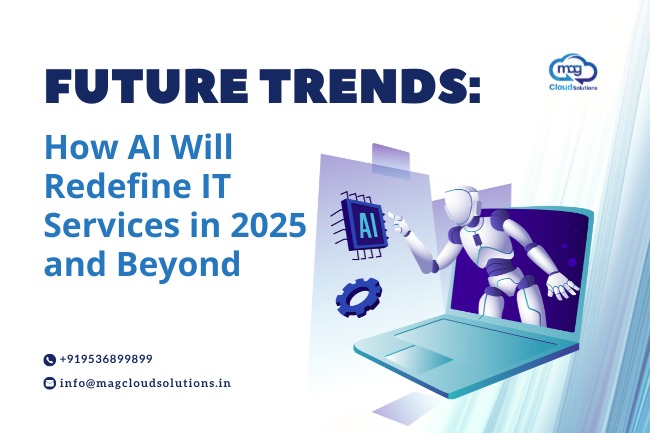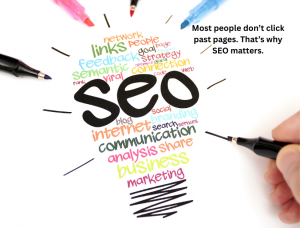The digital world is evolving faster than we can blink. And when it comes to the IT services sector, artificial intelligence (AI) is not just an emerging trend – it’s a force that’s reshaping the very fabric of how businesses operate and how we, as individuals, interact with technology. In the next few years, particularly as we approach 2025, AI promises to redefine IT services in ways we might never have imagined before. From automation and data analysis to security and customer service, AI will leave a significant imprint on every corner of the IT industry.
So, what does the future of IT services look like when AI is front and center? Let’s take a closer look.
1. Smarter IT Support and Automation
Remember the days when IT support meant waiting for hours for someone to fix your technical glitch? With AI, those days are numbered. As AI becomes more sophisticated, IT service desks will be powered by intelligent virtual assistants, capable of diagnosing and solving issues in real time. Imagine your computer throwing a fit and an AI-powered chatbot quickly identifying the problem, troubleshooting it, and even resolving it without the need for human intervention.
This shift means faster response times and, perhaps more importantly, 24/7 availability. IT support won’t be limited by time zones or working hours. AI will also allow businesses to automate repetitive IT tasks – from patch management to system updates – freeing up IT professionals to focus on more complex and strategic initiatives.
Key takeaway: IT support will evolve into a seamless, AI-powered experience that not only accelerates resolution times but also enhances the overall efficiency of IT operations.
2. Predictive Analytics and Proactive Services
AI’s power to analyze vast amounts of data will lead to more proactive IT services. By 2025, we’ll see a shift from reactive problem-solving to proactive issue prevention. AI will be used to monitor networks and systems in real-time, identifying potential problems before they even happen.
For instance, instead of waiting for a server to go down and responding to the issue afterward, AI tools will be able to predict server failure by analyzing trends in system performance. These predictions will allow businesses to take preemptive action, avoiding costly downtimes and ensuring smoother operations.
This trend isn’t limited to system maintenance either. AI will also help businesses make smarter decisions by analyzing trends, identifying inefficiencies, and suggesting improvements in areas like cloud management, software development, and even user behavior.
Key takeaway: Predictive analytics will transform IT services from reactive to proactive, saving companies time and money by preventing problems before they escalate.
3. AI-Driven Cybersecurity
In an age where cyberattacks are growing increasingly sophisticated, AI will play a crucial role in bolstering cybersecurity efforts. By 2025, AI will be deeply embedded in security infrastructures, not just reacting to threats, but anticipating them.
AI-powered systems will continuously learn and adapt, recognizing patterns in cyber threats and identifying anomalies that might go unnoticed by human eyes. This means that security breaches, which traditionally take hours or even days to detect, will be flagged and neutralized in real-time, reducing the potential damage.
Additionally, AI will help with everything from identity authentication to fraud detection. For example, biometric systems like facial recognition and voice identification will become more common as AI systems ensure that only authorized personnel can access sensitive information.
Key takeaway: As cybersecurity threats become more complex, AI will be the front line, protecting businesses from emerging and unknown risks.
4. Hyper-Personalized Customer Experiences
IT services aren’t just about systems and infrastructure anymore; they’re also about delivering experiences. As AI evolves, IT service providers will leverage machine learning and deep learning to offer hyper-personalized experiences to their customers.
For example, businesses could use AI to analyze customer interactions and provide tailor-made IT solutions that perfectly match their needs. Imagine an AI-driven IT consultant that understands a company’s unique business processes and suggests the most efficient IT tools, software, or strategies to enhance productivity and performance.
On the customer service side, AI-driven chatbots and virtual assistants will become even more human-like. They’ll be able to understand not just specific commands, but also the tone, context, and emotions behind customer queries. As AI becomes more intuitive, it will create a seamless interaction between businesses and their customers.
Key takeaway: IT service providers will tap into AI to deliver highly personalized, seamless, and intuitive customer experiences that feel more like a conversation than a transaction.
5. AI-Enhanced Cloud Services
Cloud computing has been a game-changer for businesses looking to store and access data remotely. But as AI makes its way into the cloud, the possibilities are expanding exponentially. By 2025, AI will be integrated into cloud platforms to enhance everything from data storage and management to processing and security.
AI-powered cloud solutions will offer smarter resource allocation, more efficient data storage, and even better scalability, adapting to a business’s needs in real-time. Furthermore, AI will make it easier for businesses to optimize their use of cloud resources, reducing costs while enhancing performance.
Additionally, cloud providers will leverage AI to predict usage patterns, allowing them to offer businesses highly customizable and dynamic cloud services that scale seamlessly as demand increases.
Key takeaway: AI will enhance cloud services by making them smarter, more efficient, and even more cost-effective, ensuring businesses get the most out of their cloud solutions.
6. The Rise of AI-Driven Development and DevOps
AI will also play a significant role in software development and DevOps (development and operations). The repetitive tasks involved in software development, such as coding, testing, and bug-fixing, will be automated by AI tools, speeding up development cycles and reducing human error.
AI will not only assist with coding but will also streamline the entire software development lifecycle. By analyzing code and data, AI can suggest improvements, automatically test systems, and even optimize code in real-time. This will allow developers to create software at a faster pace while maintaining quality and performance.
In DevOps, AI will enhance continuous integration and continuous deployment (CI/CD), making it easier for development and operations teams to collaborate and innovate without waiting for the next manual update.
Key takeaway: AI will streamline software development and DevOps, speeding up innovation and improving software quality, all while reducing manual labor.
7. Human-AI Collaboration in IT Services
While AI will automate a lot of tasks, it doesn’t mean humans are being replaced. Instead, AI will empower IT professionals by allowing them to focus on higher-level, strategic decisions. IT teams will collaborate with AI, using it as a tool to analyze data, automate workflows, and provide insights that were previously too complex to uncover.
In the future, IT professionals will play a crucial role in managing AI systems, ensuring ethical AI practices, and applying AI insights to business strategy. AI will augment human potential, creating a symbiotic relationship between machine intelligence and human expertise.
Key takeaway: The future of IT services will be centered around human-AI collaboration, where AI enhances human decision-making rather than replacing it.
Wrapping Up: A Future with AI at the Helm
By 2025 and beyond, AI will redefine IT services in profound and exciting ways. From smarter IT support to cutting-edge cybersecurity, predictive analytics, and more, AI will reshape how businesses approach technology. As AI continues to evolve, the potential for innovation in IT services is limitless – and the businesses that embrace these changes will be the ones that lead the charge into a new era of technological transformation.
The future is here, and it’s powered by AI.






